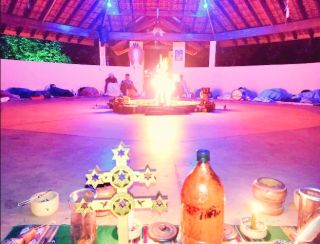Spirituality
The Sense of Self and Time During the Intake of Ayahuasca
Two ayahuasca researchers from Brazil report on their experience.
Posted May 18, 2023 Reviewed by Gary Drevitch
Key points
- During altered states of consciousness (ASC) people report a distortion of the senses of self and time.
- Psychedelics can help treat patients with psychiatric problems embedded in a psychotherapeutic setting.
- Two researchers of ayahuasca shared their personal experiences in their Brazilian ritualistic context.

In extreme altered states of consciousness (ASC) as may be induced through meditation in experienced meditators or through the intake of psychedelic drugs, people sometimes report the loss of the senses of self and time (Wittmann 2018). Empirical research shows how people having ingested psychedelics in an experimental setting, such as in a university hospital, experience at the same time a dissolution of the sense of self and time (Studerus et al. 2011). In recent years it has been shown that the intake of psychedelics such as psilcoybin, LSD, and ayahuasca in the context of a psychotherapeutic setting can help treat clients with psychiatric problems. In an earlier post, I wrote about this important work regarding the healing potential of psychedelics when ingested in a professional medical context.
Ana Paula Silva Campagnoli and Leandro Augusto Santos Pereira are conducting their Ph.D. research at the Universidade de São Paulo in Ribeirão Preto, Brazil, under the supervision of José Lino Oliveira Bueno. Building upon an initial study (Campagnoli et al. 2020) the three are continuing to study the perception of time when hearing music during an ayahuasca ritual. I had visited the researchers in Ribeirão Preto in 2019 and had been initiated by Ana and Leandro in the ayahusca ritual at Caminho Sagrado Centro Xamânico e Integrativo. In turn, they had visited me at my Institute for Frontier Areas of Psychology and Mental Health in Freiburg, Germany, to work on the collected data. I asked Ana and Leandro to write about their personal motivations to experience and study ayahuasca in their Brazilian ritualistic context. Here is what they wrote:
"In Brazil, the ritualistic use of ayahuasca tea is supported by law. In addition to the indigenous people, there are several groups that perform ayahuasca rituals in urban and rural contexts. Around 11 years ago, we had the opportunity to get to know this drink and today, at least once every 15 days, we use this tea in ayahuasca ceremonies.
"In order to know and experience what the magic of ayahuasca really is, some things are important: the origin of the tea, the ritualistic context and the guidance of an experienced person. These are indispensable elements to have a connection and deepen the benefits and teachings that this forest medicine can bring to those who allow themselves to enter this journey, and experience a safe journey. Each person seeks ayahuasca for some reason, be it curiosity, recreation, emotional problems, lack of hope in life, a spiritual search, healing for various illnesses.
"In all these years, we have never had an experience like another. When we think we are beginning to understand what ayahuasca is, we are always surprised. We can say that there is a magic endowed with an intelligence in tea, which is able to perceive your intention in the present moment and show you things from a totally different perspecive. This is what we call consciousness expansion.
"Expanding consciousness with ayahuasca allows you to access your whole being, physical, emotional and spiritual. Your five senses—touch, smell, taste, hearing, and sight—can be thoroughly amplified in the period during the action of the tea. Your memories, feelings, pains, questions existing in your thoughts, can be accessed and transfigured, in order to bring solutions and acceptance by changing your mind's observation point.
"The experience with tea can often be frightening and difficult, which is why it is important to have people experienced in the use of ayahuasca helping you in your process. This goes far beyond a doctor and a therapist. The presence of someone who knows the path you are taking, who knows exactly how your heightened senses are and the potency of what the tea can do to your body and mind, can bring you the necessary calm and confidence to have patience in difficult times. Knowing how to keep your breath calm and receiving instructions from experienced people help you to remain firm in your thoughts.
"What are the experiences like? For example, we had contact with forest spirits, such as animal spirits, which transmitted us knowledge based on their behavior. We even experienced the act of being devoured by an animal and this interaction brought about a kind of symbiosis with the animal's spirit and we were able to incorporate its knowledge and wisdom. We experienced contacts with the most different possible deities such as Buddha, Jesus, Krishna, Shiva, angels, who made us experience what unconditional love really is and the importance of forgiveness. We've been through very clear spiritual surgeries in which we've seen our bodies being opened and operated by different beings. We also experience absolute oneness with the universe and all beings. The person's attitude towards the process is what will allow the individual to delve deeper into what the tea has to show for each of us, at each moment.
"The experience is like being a navigator. As the navigator acquires experience with the sea, he can advance and explore other waters. The way each one of us develops a relationship and acquires experience with the tea will allow us to advance and stabilize the mysteries offered by ayahuasca."
References
Campagnoli, A. P. S., Pereira, L. A. S., & Bueno, J. L. O. (2020). Subjective time under altered states of consciousness in ayahuasca users in shamanistic rituals involving music. Brazilian Journal of Medical and Biological Research, 53 (8).
Studerus, E., Kometer, M., Hasler, F., & Vollenweider, F. X. (2011). Acute, subacute and long-term subjective effects of psilocybin in healthy humans: a pooled analysis of experimental studies. Journal of Psychopharmacology, 25(11), 1434–1452.
Wittmann, M. (2018). Altered states of consciousness: Experiences out of time and self. Cambridge, MA: MIT Press.


